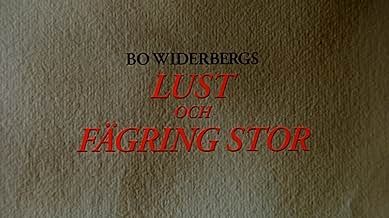O Stig, um aluno de 15 é atraído pela beleza de a Viola, sua professora de 37 anos, e ela, atraída por ele por sua juventude e inocência, sente que é um alívio enviado por Deus de seu marido... Ler tudoO Stig, um aluno de 15 é atraído pela beleza de a Viola, sua professora de 37 anos, e ela, atraída por ele por sua juventude e inocência, sente que é um alívio enviado por Deus de seu marido bêbado e miserável.O Stig, um aluno de 15 é atraído pela beleza de a Viola, sua professora de 37 anos, e ela, atraída por ele por sua juventude e inocência, sente que é um alívio enviado por Deus de seu marido bêbado e miserável.
- Direção
- Roteirista
- Artistas
- Indicado a 1 Oscar
- 6 vitórias e 7 indicações no total
Avaliações em destaque
Rape is rape. The "love scenes" are rape. Imagine if the genders were reversed or both the teacher an the child were male, you would see it clearly as rape. Teachers have authority and power over children and just like in the US -- in Sweden it is legally rape for a teacher in a school to have sex with a minor child who attends that school. There is no age under 18 where a minor may consent with a teacher
Again if the genders were reversed in this and it were some 35 or 40 year old guy teacher and his 15-year-old girl student would we be saying, as some reviewers here are, that the "love scenes were "tender" and "beautiful." WTF?
Again if the genders were reversed in this and it were some 35 or 40 year old guy teacher and his 15-year-old girl student would we be saying, as some reviewers here are, that the "love scenes were "tender" and "beautiful." WTF?
Bo Widerberg was honored in February 1997 at the Miami Film Festival with a retrospective (ELVIRA MADIGAN), and his latest (last?) film, the Oscar nominated ALL THINGS FAIR. I then saw ALL THINGS FAIR for the second time, and despite its length, enjoyed it as much or more than the first time I saw it in an arthouse theatre in Toronto. I think ALL THINGS FAIR is the great Swedish director's best, most personal film. You can't help but notice it must be autobiographical by the passion and the vivid recreation of WW II Sweden, as it was when Mr. Wideberg himself was the lead character's age. Speaking of him, the lead is the director's own 17 year old son, Johan Widerberg, who will undoubtedly carry on the family tradition in Swedish cinema history. Mr. Widerberg (Sr.) passed away last year, and among his legacy, this film stands out. It is a rare coming of age story in a setting seldom depicted on screen. Mr. Wideberg's screenplay, and direction, plus excellent performances by his son and two of Sweden's greats, Marika Lagerkrantz and Tomas van Bromssen make this a movie every European film buff should watch. It's now available on video. Check it out.
This was to be director Widerberg's last movie. A sweet family farewell, since his son played the lead in it. What his last words may be, as expressed in this movie, though, is hard to say. There is no clear moral in it, for which I am thankful, but a somewhat distressing observation about love: it is a close neighbor to hate, and it will not leave without vengeance.
The love affair between the school teacher and the teenage student is interesting when it starts to break up, but its beginning is too swiftly dealt with to make any sense, and its joyous, lustful phase is without depth. Only when things go awry, does the story get interesting, and the actors get to excel in their art.
The title is from a psalm, which is traditionally sung by students when they leave school for the summer break - or for good. It's a hymn to the summer and its luscious splendor - therefore, a lust of another kind, than the carnal one the movie deals with. Some Widerberg irony, no doubt.
Using his son as the student in the movie, was not that good an idea, although Johan Widerberg has a rare charisma on screen, and his own odd talent in acting. His father seems not to have been able to treat his son with the same merciless exploitation, as he was quite apt to do with other actors. So, the student is left hanging in a kind of vacuum, as if empty of his own intentions and conflicts. Things happen to him, as if he had nothing to do with them.
In this type of drama, it is important that the characters are stripped naked - well, mainly their souls, but bodies too, if need be. Widerberg manages the latter with his son, briefly, but not at all the former. When wanting to protect his son, he actually abandons him - for no other reason than the inhibitions in his own fatherhood. Johan, on the other hand, seems to be prepared to do any sacrifice necessary, to make the movie work.
I could be wrong. But the impression remains: the student's story never really gets to be told, because he is not allowed to be present, completely.
The love affair between the school teacher and the teenage student is interesting when it starts to break up, but its beginning is too swiftly dealt with to make any sense, and its joyous, lustful phase is without depth. Only when things go awry, does the story get interesting, and the actors get to excel in their art.
The title is from a psalm, which is traditionally sung by students when they leave school for the summer break - or for good. It's a hymn to the summer and its luscious splendor - therefore, a lust of another kind, than the carnal one the movie deals with. Some Widerberg irony, no doubt.
Using his son as the student in the movie, was not that good an idea, although Johan Widerberg has a rare charisma on screen, and his own odd talent in acting. His father seems not to have been able to treat his son with the same merciless exploitation, as he was quite apt to do with other actors. So, the student is left hanging in a kind of vacuum, as if empty of his own intentions and conflicts. Things happen to him, as if he had nothing to do with them.
In this type of drama, it is important that the characters are stripped naked - well, mainly their souls, but bodies too, if need be. Widerberg manages the latter with his son, briefly, but not at all the former. When wanting to protect his son, he actually abandons him - for no other reason than the inhibitions in his own fatherhood. Johan, on the other hand, seems to be prepared to do any sacrifice necessary, to make the movie work.
I could be wrong. But the impression remains: the student's story never really gets to be told, because he is not allowed to be present, completely.
"All Things Fair" is a strange kind of film because it is always transforming itself. While it always remains a coming-of-age film it ranges in its focus, touching on many different expressions. Obviously this makes it hard to categorise, hard to follow, hard to analyse, and all this seems to add up to a good thing. It starts out so luridly that I thought I was in for a Swedish version of "Private Lessons" but somehow it manages to continually evolve into something quite else. The changes in pace and locus give the narrative a certain elliptical feel which consolidate the nostalgic representation. Pretty good performances all round and some unexpected twists in the tale make it well worthwhile.
I caught this film on Canadian television, and I was startled by the risque content being broadcast on a non-pay station. This is a story of a growing adolescent boy in a war-torn Europe. The focus of the movie is in the complex relationships he holds with the people in his life. The controversial nature may deter the more conservative American; however, the characters are well-rounded and acted and the cinematography is superb. I have a feeling this director may be famous in his home country, there is a touch of epic brilliance in the movement of the scenes.
Você sabia?
- CuriosidadesThe original title, "Lust och fägring stor" ("Great Lust and Beauty"), is taken from the second verse of Swedish hymn "Den blomstertid nu kommer" ("Now the time of blossoming arrives"), which is traditionally sung in schools before closing for the summer holiday:
"Den blomstertid nu kommer/ med lust och fägring stor. Du nalkas, ljuva sommar, då gräs och gröda gror. Med blid och livlig värma/ till allt som varit dött, sig solens strålar närma, och allt blir återfött."
("The flowering season's here now/ With great lust and beauty. Delightful summer's near now/ When grass and plants deploy. The gentle sun's warmth coaxes/ Fresh growth in what's been dead, As soon as she approaches, Reborn life lies ahead.")
- Erros de gravaçãoRCA Red Seal records are shown playing on the phonograph nearly every time Stig and Kjell are listening to classical music, and when Stig is listening to a classical recording at his home; none of the pieces on the soundtrack were RCA recordings.
- ConexõesFeatured in Lust och fägring - En film om Bo Widerbergs sista (2015)
- Trilhas sonorasRinaldo: Lascia ch'io pianga
Music by George Frideric Handel (as Händel)
Performed by Lesley Garrett with The Philharmonia Orchestra
Conducted by Ivor Bolton
Silva Screen Records (UK)
Principais escolhas
Faça login para avaliar e ver a lista de recomendações personalizadas
- How long is All Things Fair?Fornecido pela Alexa
Detalhes
- Data de lançamento
- Países de origem
- Idiomas
- Também conhecido como
- La belleza de las cosas
- Locações de filme
- Empresas de produção
- Consulte mais créditos da empresa na IMDbPro
Bilheteria
- Orçamento
- DKK 25.000.000 (estimativa)
- Faturamento bruto nos EUA e Canadá
- US$ 13.128
- Fim de semana de estreia nos EUA e Canadá
- US$ 4.530
- 10 de mar. de 1996
- Faturamento bruto mundial
- US$ 13.128
Contribua para esta página
Sugerir uma alteração ou adicionar conteúdo ausente

Principal brecha
What was the official certification given to Todas as Coisas São Belas (1995) in Brazil?
Responda























